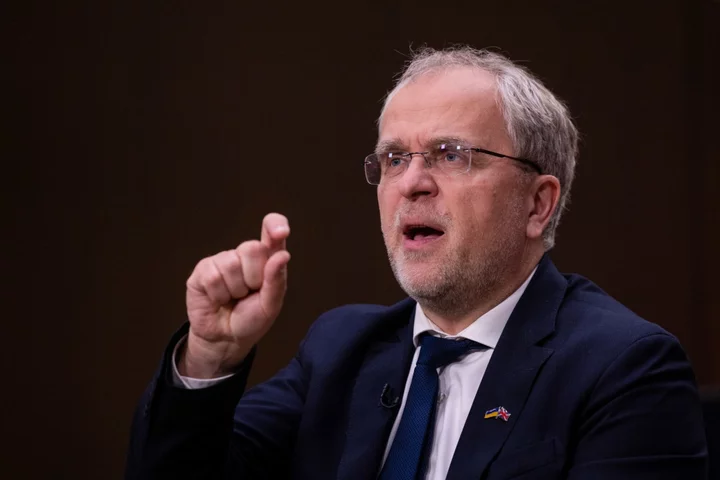Ukraine’s biggest telecom operator pledged to boost spending by a third to rebuild systems destroyed by Russian forces, relying on Chinese suppliers for the time being as its Western allies are pulling back.
Kyivstar plans to spend $600 million on reconstruction, upgrades and digital services in the next three years, Chief Executive Officer Oleksandr Komarov said in an interview with Bloomberg in London. The company, owned by Dutch-domiciled Veon Ltd., will use longstanding vendors like Huawei Technologies Co. and ZTE Corp. to rebuild the critical infrastructure.
The decision highlights how the fallout from Russia’s invasion is politicizing the way that companies like Kyivstar may operate in the future. As Ukraine begins the process of joining the European Union and NATO, its businesses may have to join those alliances’ wide-ranging reckoning with Chinese technology.
“In case of, let’s say, a Chinese swap across the whole market, it should be a long-term vision and plan in place, with probably even some financial support provided to the Ukrainian operators,” Komarov said in an interview with Bloomberg in London on Tuesday.
Reducing reliance on Chinese technology would not be “straightforward” for Kyivstar, and would likely require a joint plan developed between Europe, the US and Ukraine, he added. “We have networks in place. We are providing critical services.”
Komarov is visiting London for the Ukraine Recovery Conference, where world leaders including US Secretary of State Antony Blinken and European Commission president Ursula Von Der Leyen will discuss the country’s future as the conflict continues.
Many operators across the EU use Huawei and ZTE today, but the European Commission is hardening its stance against the two vendors, citing security fears. Last week it described them as “high-risk” for the first time, banned them from the bloc’s official systems, and encouraged member states and carriers to crack down. The decision drew criticism from both businesses and the Chinese government, who deny there are security risks.
Komarov suggested Kyivstar’s supply chain would shift toward Western businesses over time. “It is a kind of organic development,” he said. “As the future part of the European Union, we will definitely obey all the rules and policies, there is no doubt.”
Huawei and ZTE make up almost 100% of Kyivstar’s radio access network — including components like antennas — and less than 30% of the more critical and sensitive core network, Komarov said. They make up almost 60% of the Ukrainian market, he said. China has said Chinese vendors make up the same proportion of Germany’s 5G telecom infrastructure and, until a 2020 ban, Huawei was central to Britain’s 5G roll out plan.
Given its critical services and long-term supply contracts, a total, urgent swap to Western suppliers would be “impossible,” Komarov said. If government rules change, the company has a potential “mid-term program” which could involve swapping Chinese core components to European vendors, he said — the main two being Sweden’s Ericsson AB and Finland’s Nokia Oyj.
Reconstruction
Komarov said five of Kyivstar’s employees have been killed in the war, and many more have been displaced. Meanwhile, the business has become a regular target of cyberattacks. During the interview, he read an internal operational message from his phone describing a two-hour long “massive, high-scale distributed denial-of-service attack” earlier that morning.
Some 7% of Kyivstar’s network has been rendered unusable by the conflict — an improvement from the 10% figure Komarov shared last year, as Ukraine fights a counteroffensive to take back Russian-occupied territory.
But he has to look beyond the daily calamities of wartime operations, too, and expressed hope that others would also make commitments to invest in Ukraine.
“We feel that this is part of our social responsibility: to build, to invest, to recover, and somehow to give an example,” Komarov said of the reconstruction plan. “It is definitely not enough to invest only in current emergency needs.”
(Updates with additional CEO quote in eighth paragraph)

